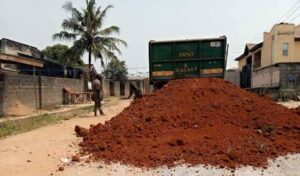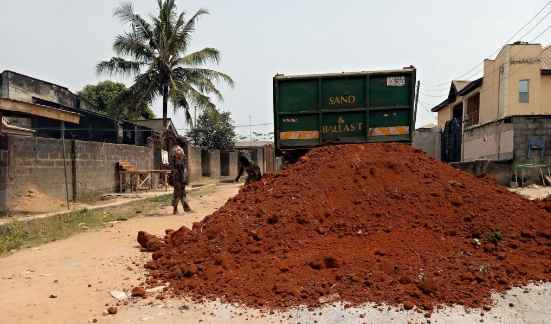Sand is an important building resource that is used in a variety of shapes and quantities in construction, landscaping, and other tasks. It is also a valuable resource in several nations, including Nigeria, where it is harvested, processed, and shipped. In this post, we will explore the factors that affect the price of sand in Nigeria, and how you can estimate the cost of a trip of sand for your project.
A trip of sand is sold anywhere from N50,000 to N380,000 depending on the ton size.
What Is a Trip of Sand?
A trip of sand is a load of sand transported by a truck or other vehicle. The amount of sand that can be transported in one trip is determined by the vehicle’s size and capacity, as well as the distance and conditions of the trip. A 10-ton truck, for example, can transport around 10 cubic meters of sand, which is comparable to 10,000 liters or 2,640 gallons. However, depending on the kind, moisture content, and packing density of the sand, the actual volume and weight of the sand may vary.
What Factors Influence Sand Prices in Nigeria?
Sand is a commodity that is affected by supply and demand, as well as legal and environmental limits. Some of the major elements influencing sand prices in Nigeria are:
Sand is classified into several categories based on particle size, shape, and chemistry. Coarse sand is made up of bigger grains and has a rough texture. It is also known as pit sand or river sand. It is more expensive than fine sand and is typically used as a base or filler material.
Fine sand, also known as plaster sand or construction sand, has a smooth texture and is composed of tiny grains. It is less expensive than coarse sand and is used as a top layer or finishing material.
There are also specialty sands, such as silica sand (used in glass and ceramics) and foundry sand (used in metal casting). Each sort of sand is priced differently based on its quality, availability, and intended application.
Sand can be harvested from natural sources such as rivers, lakes, and oceans, as well as from man-made sources such as quarries and mines.
Natural sand is typically favored due to its cleanliness and consistency, but it is also scarce and susceptible to environmental degradation.
Artificial sand is created by crushing and screening rock or other materials, and while it is more abundant and controllable, it may contain impurities or pollutants. The price and availability of sand are affected by its location, accessibility, and environmental impact.
Cost of transportation: Sand must be carried from the source to the destination, and the cost of transportation affects the sand price. The cost of sand delivery is affected by the distance, geography, and infrastructure of the route, as well as the form of transportation, fuel costs, and maintenance charges. Furthermore, sand demand may change seasonally or regionally, affecting the availability and price of sand in different regions.
Sand is a taxable commodity in Nigeria, and the government levies a variety of taxes and fees on its production, transit, and sale. These taxes and charges vary depending on the type of sand, the area, and the purpose of the project, and they can have a major impact on sand prices. Sand used for building, for example, is subject to 5% VAT, although sand used for other uses may be subject to varying tax rates or exemptions. It is critical to understand and account for the tax consequences of sand purchases when estimating costs.

Why you should get Sand from Adekemi Supplies
One of the primary reasons to buy sand from us is to ensure that you are getting a high-quality product that meets the requirements for use in construction projects. Adekemi Supplies will normally take care to find and supply only the highest quality sand, and may also provide screening and washing services to guarantee that the product satisfies the required criteria.
Convenience is another advantage of buying sharp sand from Adekemi Supplies. Adekemi Supplies will provide simple delivery choices to guarantee that you have your sand when and when you need it, regardless of how much you order.
When making a purchase, it is also crucial to consider the cost of sharp sand. To assist you to save money on your purchase, a quality provider will normally offer competitive pricing and may give bulk discounts. Adekemi Supplies will also be upfront about price and happy to provide quotes and estimations upon request.
Finally, while acquiring sharp sand, it is critical to consider outstanding customer service. Adekemi Supplies values its clients and is committed to delivering exceptional customer service, which includes resolving any questions or issues you may have about the product or the purchase process.
ALSO SEE: How Much Is A Trip Of Sharp Sand In Nigeria?
How Do You Calculate the Cost of a Sand Trip in Nigeria?
Now that we’ve reviewed the key elements influencing sand prices in Nigeria, you might be asking how you might estimate the cost of a sand trip for your project. Here are some actions you can take to achieve a ballpark figure:
Determine the type and amount of sand required: The first step is to figure out what kind and how much sand you’ll need depending on your project specs, local norms, and material availability. For example, coarse sand may be required for a foundation, whereas fine sand may be required for a plaster or concrete mix. You can calculate the volume of sand required by multiplying the area and thickness of the layer you wish to cover by the density of the sand and then converting that to the weight or volume of sand. For example, if you need to cover a 50-square-meter area with a layer of 5 cm coarse sand, you will require approximately 250 liters of sand (50 x 0.05 x 1,600).
Find a dependable provider: The next step is to choose a dependable sand supplier who can match your quality, quantity, and delivery needs. You can compare costs and services by searching online, asking for referrals, or visiting local sand markets. You should also analyze the supplier’s reputation, experience, and knowledge, as well as the sale terms and conditions, such as payment method, delivery timetable, and warranty.
Request a quote: Once you’ve found a possible provider, you should request a quote for the sand you require. You can accomplish this by contacting the supplier by phone, email, or online form and providing them with project data such as the type and quantity of sand, the location and delivery date, and any special requests or requirements you may have. The provider should give you with a written quotation that contains the entire cost of the sand as well as a cost breakdown, such as the price per unit of sand, transportation costs, and any taxes or tariffs.
Negotiate and seal the deal: Once you’ve received the quotation, you can try to negotiate a better price or terms with the supplier. This can be accomplished by comparing the quotation to market prices, flagging any errors or omissions, and emphasizing the advantages of working with you. You might also try to increase your bargaining power by buying in quantity, paying in advance, or offering preferential payment or delivery terms. Once you have reached an agreement with the supplier, you should finalize the transaction by signing a contract or a purchase order outlining the terms and circumstances of the sale.
After you have placed your order, you should monitor the delivery of the sand to ensure that it fulfills your expectations and requirements. This can be accomplished by checking the delivery’s status, inspecting the sand when it arrives, and testing the sand as needed. You should also speak with the provider if you have any questions or concerns regarding the sand, and you should settle any difficulties or disagreements that may develop.
Conclusion
Sand is an important building resource that is used in a variety of forms and quantities in many Nigerian projects. Sand prices are affected by a number of factors, including the kind and supply of sand, transportation costs, taxes and tariffs, and competitiveness and negotiating strength.
To calculate the cost of a sand trip in Nigeria, you must first decide the type and quantity of sand required, then choose a reputable supplier, obtain a quotation, negotiate and finalize the agreement, and monitor delivery and quality.
You can ensure that you get the appropriate product by following these procedures.
